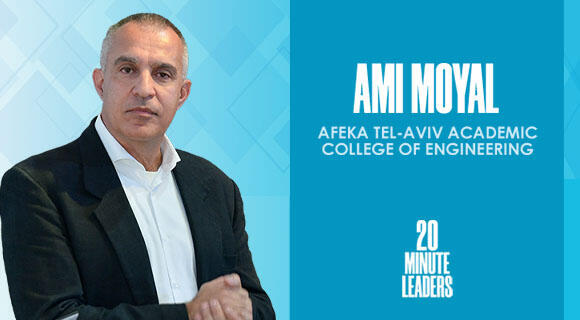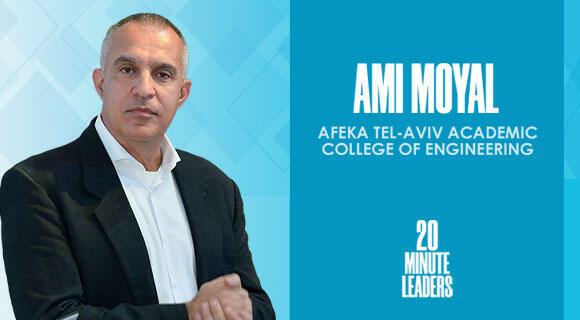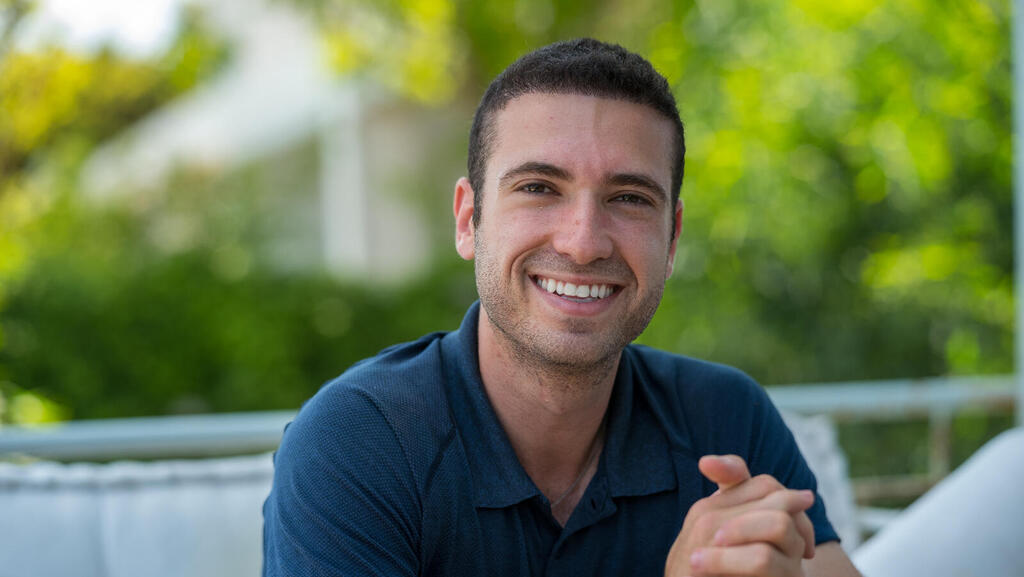
20-Minute Leaders
“The whole education continuum must change, from kindergarten to academia.”
Changing engineering education is the mission for Ami Moyal, president of Afeka Tel-Aviv Academic College of Engineering.
Changing engineering education is the mission for Ami Moyal, president of Afeka Tel-Aviv Academic College of Engineering. He says that education from kindergarten to university must shift to adapt to the fast-changing world, and he is implementing changes at Afeka to meet the needs of students and employers. Moyal explains that he has helped create engines of change that allow faculty to implement more hands-on and engaging learning experiences that fit their own passion. The high tech industry needs engineers who have excellent critical thinking, self-learning, teamwork, and communication skills, he says. You can only become excellent at things that you like to do, he shares, so it is important that students find what they are curious about and enjoy their learning. Moyal loves his work in education, a field he joined later in life when he realized it was a great fit for his previous experience and passion.
Let's start high level about your own mission. What is your purpose right now?
The main strategic point of my work today, my mission actually, is that I'm implementing a major change in engineering education. As a whole, I think that the whole education continuum, from kindergarten to academia, must change. We are not adapting the education continuum to the new world.
I'm leading a process in the last five years of changing the educational process of engineers. The high tech in Israel needs a different type of engineers, not only knowledge, but emphasis on skills like self-learning, critical thinking, teamwork, effective communication skills. That's the output. In the inputs, the students of today are learning differently. I want them to learn with passion and curiosity, so we need to change the frontal lecture to something that encourages curiosity and is more hands-on.
You were an engineer previously from the army, then the CEO of a tech company. What made you even start thinking about education as an interesting avenue to explore?
I think that I was an education person from the beginning. I was teaching in the army itself. After the age of 40, I really discovered what I want to do in life, but I brought all the experience I gained. I was the CEO of a high-tech company, so I gained a lot of managerial experience. I understand technology. Then I shaped my view on the profile of the required engineers. So all three together, it was quite natural to me.
But you didn't go straight into college of engineering. You started looking at diversity and inclusion.
Yeah. I'm looking at Israel on a national level, and I see that the high-tech industry is now 10% of the workforce. When you look at the 10% of the workforce, more than 80% of it is located physically in Tel Aviv by engineers that are coming from the center. There are Arabs, women, [people from the] periphery that are not playing in the game of high-tech in the sense of social mobility. I was chairman of Israeli Educational Foundation, which raises money in the States and gives scholarships to students in the periphery.
These are the topics that interest me, and we are doing the same here with Afeka. Although we are located in Tel Aviv, we have students from the north, south, and Jerusalem. Any student will learn in Afeka, even if there is a lack of finance to pay tuition. We are organizing scholarships. Secondly, we are working with teenagers in high school. Before choosing the matriculation path at the age of 14, we are bringing thousands of pupils from all around the country, with specific emphasis on the periphery, to visit Afeka to see that science, technology, and engineering might be interesting. You should pursue your passion. But if you like it, nobody should tell you that you cannot do it. Believe in yourself and push it. Work hard. This is my main conclusion for my career.
Let's talk a little bit about passion and curiosity for learning and how you as an educator now perceive that. How do you guide lecturers and professors to try and capture that curiosity and passion by students?
First of all, the underlying assumption of the whole discussion is that you can be excellent only in things that you enjoy doing. If you are not enjoying something, you will not be excellent because you are obliged to. We need to build engines of change for the students to discover their passion and their curiosity. In any educational system, the self-learning of the students, that's the key feature. Now it is our duty to build an enjoyable process. This new generation doesn't learn by sitting in class for eight hours. In the last five years, we have implemented dozens of courses in a different pedagogy.
For example, we have a course that I like very much, Principle of Sailing. You learn electronics, you learn mechanics, you learn green energy. At the end of the course, we hire small yachts that the students, in groups of four, are sailing. Teamwork, excitement, handling with pressure, and a lot of joy.
We are learning outside of class, going to hospitals, going to the industry. So it's a mixture of frontal teaching together with hands-on. Many courses start with a half an hour of introduction by the lecturers and then divide into groups, putting projects on the table, practicing teamwork, self-learning, discussion, presentation. But we believe that every lecturer should know what's the best pedagogy for his course. We built engines of change to support our faculty to implement their passion.
How do you create those agents of change? What do you need to do to change that mindset?
First of all, organizations and people are reluctant to implement change. About six years ago, I put on the table a strategic mission: the world is changing; we must adapt. We should do it now, not waiting for the world to press us. Then I convinced the organization.
Secondly, we went to define, "What is the profile of an engineer that is graduating from Afeka that if you see all the skills, you'll be happy with yourself that you have an excellent education system?" We defined altogether what is the ultimate profile of a graduate of Afeka: scientific knowledge; engineering knowledge; personal skills; self-learning; teamwork; engineering skills; languages: English, Hebrew, software; ethical values; and broad knowledge. Once we reached an agreement of what is the output, our work was much easier. Then the whole organization targeted all activities toward the output.
Then we begin to build, by my leading, engines of change. In the last three years, the engines of change are working. I see the change, and I believe that the change will continue because the world around us is changing so fast. Organizations cannot permit themselves to stay at a certain point. The constant change will become the new normal. That's very difficult in academia. But we did it. We are there.
How do you know what's working and what's not working? How do you measure the success of these programs?
Once you implement it, you want to define the measure and measure yourself on a yearly basis. The main measure is if the industry is hiring our graduates, if they are satisfied with them, if they are paying a proper salary, and if they are working in the high-level positions.
I'm measuring everything. Just for data to continue discussions, not as a strict measurement of management. We must move forward, measure, adapt. This is how I'm leading the organization in the uncertainty around. So the main measure is the industry and if they hire. 97% of our graduates are hired. I have a major problem. They are working before they complete their studies. There is a need for high-tech, so they take them in the second or third year. That's not very good because engineering studies are very difficult. You need to study full time for the first three years.
We also want to measure the progress in skills during the process. We have a group, and we are trying solution by solution, doing pilots to see how we can evaluate teamwork, self-learning, and effective communication.
Last point, satisfaction of students. I think that the majority are quite satisfied through the process. Eight years ago, we were able to accept 450 new students a year. We had about 600 applications. Last year, we could accept 750 new students. We have 12,000 applications. So there is a demand from the side of the market, and there is a demand from the side of the applicants.
Michael Matias, Forbes 30 Under 30, is a Venture Fellow at Innovation Endeavors as well as investment Venture Partner at Secret Chord and J-Ventures. He studies Artificial Intelligence and Human-Computer Interaction at Stanford University, and was an engineer at Hippo Insurance. Matias previously served as an officer in the 8200 unit. 20MinuteLeaders is a tech entrepreneurship interview series featuring one-on-one interviews with fascinating founders, innovators and thought leaders sharing their journeys and experiences.
Contributing editors: Michael Matias, Megan Ryan














